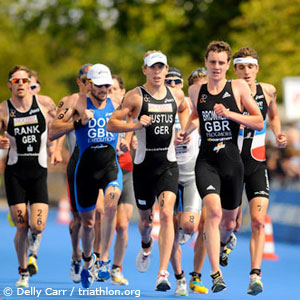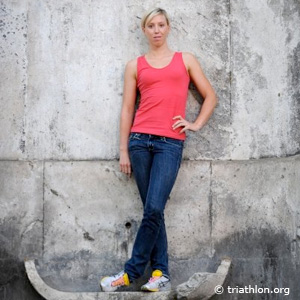ITU World Championship preview
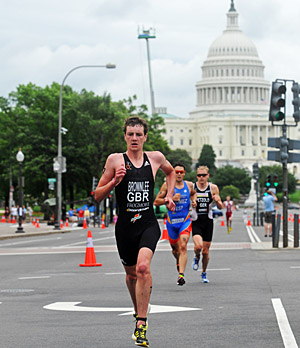
After seven ITU Dextro Energy World Championship Series events, it’s come down to the Grand Final at Surfer’s Paradise on Australia’s Gold Coast this weekend. Compressing the race that count for the World Title chase has guaranteed topnotch fields and many finish line sprints at Tongyeong, Madrid, Washington DC, Kitzbuhel, Hamburg, London and Yokohama and all-but-anointed new champions in a post-Olympic year.
Somehow, including all of these races in the World Championship Series points equation has built interest in the Olympic-distance, draft-legal sport in a year of economic downturn. This reorganization into a NASCAR-style season-long points race has energized the best athletes to show up at virtually every race and simplified the matter of season long scheduling.
And yet the key element of the format change – giving double points but no championship status to the Grand Final – may have elevated interest in every WCS race but it has also taken away from the electricity of a one day championship event in which a triumph is now only part of a bigger picture. For a parallel, compare the excitement of an all-or-nothing dash to the finish at the Indianapolis 500 versus cheering on Jimmie Johnson carefully guiding his Chevrolet to a safe 15th place finish in Miami to secure the NASCAR points title.
On the men’s side, 21-year-old sensation Alistair Brownlee of Great Britain scored a perfect four-for four in the required number of WCS races he has entered, showing perfect swim-bike readiness and unleashed a dominating the best run in the series – and perhaps the best in Olympic distance triathlon history. Admirably fighting to recover his early 2008 form in the face of lingering injury, Javier Gomez has offered the most resistance, but his two 2nds and two 3rd places give Brownlee an overwhelming points advantage. If Gomez wins at Surfers Paradise, Brownlee has to finish worse than 6th and holding out hope for the scholarly, freckled Brit requires putting a hex on a Brownlee doll and hoping he suffers some sort of accident or meltdown.
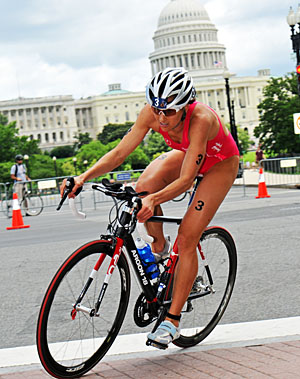
More excitement awaits the results of the women’s contest. The dominating 2008 ITU World Champion, winner of a record 20 ITU World Cups and Beijing Olympic silver medalist Vanessa Fernandes of Portugal pulled out of the 2009 WCS with injuries suffered in a bike crash this spring. The 2008 Beijing winner and three-time ITU World Champion Emma Snowsill is convalescing from a career-threatening hip injury and out of action since June (still winning the WCS Round One in Tongyeong, then scoring seconds at Washington DC and at the $1 million Hy-Vee World Cup). So with the door wide open, squad mate Emma Moffat, also coached by Snowsill fiancé Craig Walton, took second to Snowsill at Tongyeong and won three WCS events and built what had appeared to be an unassailable WCS points lead. But when Moffat suffered a partial tear in her plantar fascia after her win at Hamburg and retreated to Oz to rehabilitate and recover, Sweden’s Lisa Norden stepped to the plate and scored a second at London and a win at Yokohama to pull within 120 points going into the Grand Final. This means that if the currently red-hot Scandinavian wins, Moffat must finish second or she will lose the title.
After six weeks of rest, physio, stretching and careful non-impact training, Moffat is optimistic. “It hasn’t been hurting while I’ve been running,. So there is no reason why it will hurt on race day,” said the virtually-invincible-before-the-injury Miss Moffat. “Obviously I haven’t been able to run as much as I would have liked, but my fitness is still there.”
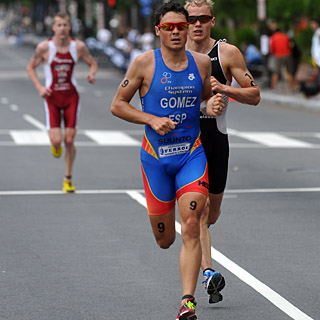
On the men’s side, there is little hope that barring crash or injury that Brownlee could surrender the world title on points. But as Gomez increasingly returns to form, there is hope that the Spaniard – or some late-season charger – can spoil Brownlee’s perfect WCS season and take the Grand Final. Point of fact: Gomez beat Brownlee at the European Championships a few weeks ago. Second point – it’s hard to maintain peak fitness all season and Brownlee has not raced a WCS field since London early last month.
Brownlee maintains a sportsmanlike modesty about his big lead, perhaps hoping to avoid jinxing his chances with untoward overconfidence. “It’s amazing,” he told ITU media, “If anyone had told me at the beginning of the year that I’d win four (of seven World Championship Series events) I would have thought they were joking. Even after my first win, I didn’t have any attitude or think I’d win another three. But each one has been a completely different race and I’m just happy to be in the position I’m in.”
Gomez, who started slow with lingering leg problems that hampered his Olympic effort, was also slowed by a nasty bike crash that cost him a yard of skin at London. “I’m happy with my performance considering I was stuck with an injury – it wasn't a very good year for me. But now I’m in second place and I won Europeans so I’ll just keep on going.”
Brownlee points out that ITU racing has become so competitive that long term domination is a long shot proposition. “The exciting thing about men’s racing is that 20 people could win this race,” he says. “That makes it exciting – and frustrating as well.”
In a year in which every WCS course is virtually flat, Brownlee points out that a bike breakaway is less likely but not impossible. “There have been a few breaks these year on courses (such as all flat Washington DC, in which Brownlee, Gomez, Maik Petzold, Hunter Kemper and Andy Potts got two minutes on the field) where no one would have expected it,” said Brownlee. “There’s always a chance – a slim chance – that some people can get away. But most likely chance is that it will come down to a run. But a fast run in this type of race will be pretty interesting.”


